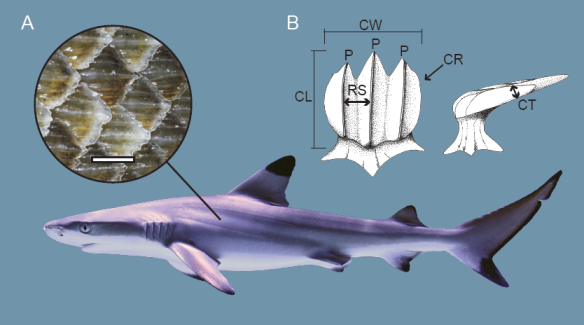Sharks are covered in denticles (tiny, tooth-like scales), which provide the animal with a tough, protective layer—but are also highly vulnerable to ocean acidification.

Consistent exposure to a low pH can degrade the denticles, essentially stripping sharks of their scales and leading to problems with their ability to swim and catch prey.
This is a situation that could worsen as climate change turns the oceans increasingly acidic, say scientists.
A team of researchers at Stellenbosch University in South Africa, investigated the effects of long-term exposure to acidified water for a period of nine weeks.
After nine weeks of exposure, the team found that around a quarter of denticles were damaged. In comparison, 9.2 percent of denticles were damaged in a control group of three sharks held in non-acidic water.
This, the authors conclude, suggests the corrosion may weaken the protective quality of the shark’s skin and reduce the ability to swim in open-water species, such as the more famous great white.
The reason for the latter is that denticles decrease drag and turbulence—in turn, increasing speed and allowing the individual shark to swim more quietly, so that they can better sneak up on prey.
While the experiments were conducted on a relatively small number of individuals—only three sharks were exposed to nine weeks of acidified water—the research implies increasing levels of ocean acidification (spurred by carbon dioxide absorption) will have an increasingly detrimental effect on denticle-carrying marine organisms, like sharks and rays.
The damage caused by acidification not only hinders the protective element of a shark’s skin but certain species’ ability to swim.
The researchers also suspect a similar level of corrosion could damage sharks’ teeth, making it harder to feed.
Reference- Futurism, Newsweek, The Conversation






